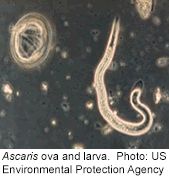
FRIDAY, Nov. 16 (HealthDay News) — For people with Crohn’s disease and colitis, relief might come in the form of swallowing microscopic parasitic pig worm eggs, according to a new animal study of that unsavory-sounding treatment.
In five young rhesus monkeys diagnosed with “idiopathic chronic diarrhea,” worm treatment relieved their symptoms and resulted in a healthier gut and reduced inflammation of the large intestine, or colon.
Such worms — or helminths — typically have resided in the human intestinal tract, helping to keep it healthy. But in the world’s most developed regions, the presence of these worms in the human body is fading. And autoimmune bowel disorders like Crohn’s and colitis are on the rise.
“Helminths are parasites, and they are pathogenic,” said study co-author P’ng Loke, an assistant professor of microbiology at NYU Langone Medical Center, in New York City. “So in much of the world we try to get rid of them, because when children that are malnourished have helminth infections it can cause severe health problems,” Loke said.
“But in the industrialized world you have to think about things from a different perspective, because a lot of autoimmune diseases have increased really rapidly over the last 50 years, as our societies have become more developed,” Loke explained. “And at the same time, while up until recently about 70 to 80 percent of people were colonized with helminths, complex changes to the environment, largely due to changes in eating habits, have drastically reduced this number.”
In industrialized countries where helminth “infections” have dropped dramatically, inflammatory bowel disease has shot up and now affects about 1.4 million Americans.
While previous research has suggested that reintroducing helminths and other microbials back into these patients might help, exactly how these worms seem to work their intestinal magic was unclear. Until now.
“What we’re talking about here are very carefully controlled and complex clinical trials in which the helminths we use are certified to be pathogen-free by the [U.S. Food and Drug Administration],” Loke said. “And what we’re seeing is that these worms seem to act to restore the immune regulatory networks, which control the immune system, by restoring gut bacteria levels and stimulating mucus production.”
The study appears in the November issue of PLoS Pathogens. The team included researchers from the University of California, San Francisco, the California National Primate Research Center in Davis, the University of Texas Southwestern Medical Center at Dallas, and New York University.
For the monkeys in the study, their diarrheal disease was considered similar to immune bowel disorders in humans, with symptoms such as progressive weight loss and dehydration. In primate research centers, the illness is one of the main causes of death among such monkeys.
Tissue sample analyses revealed that the previously impaired bacterial composition of the monkeys’ intestinal walls had been restored to near healthy levels following helminth treatment. Four of the five monkeys showed clear signs of reduced diarrhea and weight gain as a result of the intervention.
So what is a Crohn’s or colitis patient to make of all this?
“I would say that the FDA is looking at this approach as it would with any other drug, and so should the consumer,” Loke said. “It’s like a vaccine, or at least a live attenuated vaccine, in which you’re immunizing yourself with a virus that doesn’t harm you to get protection from a virus that does. And I’m sure at one point the idea of immunizing with a vaccine seemed kind of crazy. But now we understand that it’s a critical part of achieving protection.”
That thought is seconded by Dr. Edward Loftus, Jr., a professor of medicine and director of the inflammatory bowel disease interest group, at the Mayo Clinic in Rochester, Minn.
“I think the average layperson might find this horrifying,” Loftus acknowledged. “But actually the average well-read [inflammatory bowel disease] patient would probably be very eager to explore this therapy, because a lot of patients are scared by our more conventional immuno-suppressive and biologic treatments, which carry a small risk of serious infections and other side effects,” he pointed out.
“And this fascinating and kind of novel study suggests that these worms can help by significantly affecting the bacterial makeup of the colon,” Loftus said. “For the large subset of patients who are looking for an alternative approach, this finding could be incredibly appealing.”
Scientists note that research with animals — monkeys in this case — often fails to provide similar results in humans.
More information
To learn more about colitis, visit the U.S. National Library of Medicine.

